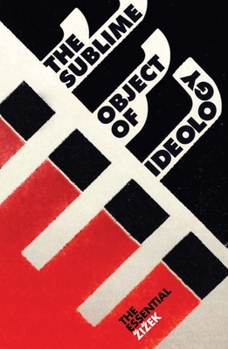The Sublime Object of Ideology
Select Format
Select Condition 
Book Overview
In this provocative and original work, Slavoj Zizek takes a look at the question of human agency in a postmodern world. From the sinking of the "Titanic" to Hitchcocks "Rear Window," from the operas... This description may be from another edition of this product.
Format:Paperback
Language:English
ISBN:1844673006
ISBN13:9781844673001
Release Date:January 2009
Publisher:Verso
Length:304 Pages
Weight:0.75 lbs.
Dimensions:0.7" x 5.0" x 7.7"
Customer Reviews
5 ratings
THE best introduction to hegel, marx, freud, and lacan
Published by Thriftbooks.com User , 18 years ago
While it is undoubtedly true that to read most recent critical theorists one wants acquaintance with the philosophical and anti-philosophical canons, Zizek is a different story. This is because he excels at giving coherent and surprisingly entertaining expositions of some of the most difficult thinkers in western thought (especially lacan, hegel, and kant). Reading Zizek will make you want to read these other writers, and Zizek's interpretations are as original as they are accurate, in both cases impeccably so. The aim of the book is manifold. Among other things it: 1. Rehabilitates Lacan's thinking against charges of obscurantism (sokal, gallop, noel carrol, et al). This is particularly true of the chapters entitled "che vuoi?" (what do you want?) and "you only die twice." The former chapter is a tour du force reading of Lacan's infamous semiotic diagrams on the dialetic of desire (see last chapter of "Ecrits" (short edition)). Improbably, this reading is built up as a response to one of the most "mainstream" debates in all of analytic philosophy: Kripke vs. Searle, anti-deescriptivism v descriptivism. Ultimately the claim is that Lacan represents the Enlightenment ideals more than anyone else today. 2. It challenges the prevailing determinist interpretation of hegel and makes an exceptionally persuasive case that hegel is THE thinker of contingency and indeterminacy and "the opened", so to speak. This is the task the conclusion of the book takes up, starting with a close-reading of the difference between Kant and Hegel's thinking on the sublime. The thing above all in Hegel's legacy is the format of hegel's reasoning, the often misunderstood dialectical triad. Read the last chapter for a definition and application of this mode of logic. 3. Begins by making the case that it was Marx and not Freud who "invented the symptom." Another original and persuasive argument, not to be missed. In edition to a new notion of ideology and how to critique it, this chapter includes one of the best short introductions Freud's theory of dreams I know of. People often deride Zizek as a "comedian/philosopher" who makes too much light of serious matters (see the new yorker profile of 2003 for such a take). And this book certainly has its share of dirty and/or political jokes. What this view forgets, however, is that while Zizek is perfectly capable of turning serious matters into jokes, it his ability to look awry at the most trivial matters, to take the big Other's jokes seriously, that is perhaps his most enduring quality as a thinker.
A True First Step
Published by Thriftbooks.com User , 19 years ago
"The Sublime Object of Ideology" is perhaps the best introduction to the Zizek-Lacan line of thought in social psychology and psychoanalysis. If "Looking Awry" may be more fascinating because of its many examples from film (Hitchcock in particular), this one thoroughly explains those conceptual knots constantly resumed in Zizek's analyses.
groundbreaking
Published by Thriftbooks.com User , 20 years ago
Zizek brilliantly combines Lacan and Althusser in his reading of Marx and ideology. Unlike other pompous incomprehensible readings of complicated theorists e.g. Lacan and Althusser, Zizek offers a sharp, shrewd, and most important, a comprehensible text to his readers. This book is probably the best introduction to the Zizek phenomenon. It is very theoritical, but it also introduces Zizek's famous references to movies and popular culture (Zizekian trademarks) in his attempt to explain complex Lacanian and Althusserian propositions. This is not a book only for those specializing in cultural or critical theory; it is written in a language which is accesible to a wider audience - Zizek turns complicated and highly philosophical ideas into a daily practice exercised by non-specialists too. The most important and Zizek's greatest achievement is his transition from the Althusserian ideology as reality to fantasy as reality. The idea of reality as an imaginary construct - a human fantasy - is the idea that constantly haunts Zizek's later works. The acknowledgement of of some impossible Real kernel becomes Zizek's most effective tool in his attempts to expose our notion of reality as fantasy. This book introduces Lacan's cognitive paradigm (Real/Imaginary/Symbolic) and Althusser's structuralist readings of ideology and society into cultural theory as never done before. This book is a must for everyone who has the courage to look into ideas that will shake the foundations of reality as we perceive it. It is in short - groundbreaking.
a must read
Published by Thriftbooks.com User , 23 years ago
a must read for any intellectual, interested in theoreticians following Lacan's writing.
Zizek's most sustained argument
Published by Thriftbooks.com User , 27 years ago
Those who know Zizek's work--and chances are you wouldn't be reading this otherwise--are familiar with the author's striking, off-the-cuff applications of Lacanian psychoanalytic theory to pop culture (e.g., Aliens, Bladerunner, Forrest Gump). While this text also contains numerous examples, it is much more theoretically oriented than "Looking Awry" or "Enjoy Your Symptom!" and as such is perhaps the best place to go if you're wondering if there is really a coherent system beneath Zizek's pyrotechnics. Contained in the book are: a (partial) synthesis of Lacan and Marx; an explication of Lacan's diagram for desire, and an insightful rectification of Hegel's commonly misunderstood dialectics






